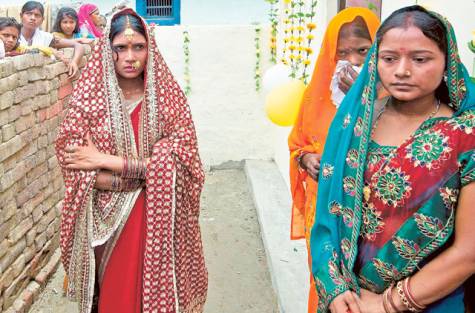
Vishnupur Khurd (Uttar Pradesh), July 4: Spotlessly clean and decorated with plastic flowers and balloons for its opening ceremony, Priyanka Bharti’s toilet is seen as a gleaming symbol of the empowerment of Indian women.
It has been built in the village of Vishnupur Khurd in Uttar Pradesh state due to the determination of Priyanka, a young bride who walked out of her new marital home when she was appalled to find she had to defecate in the open.
The ensuing drama soon became well-known in the area as the newlyweds’ scandalised families both tried to persuade her to return to her husband but she refused, saying the shame of squatting in the fields was too much to bear.
“I was adamant that I could not stay in a home where people might see me go to the toilet outside in an unhygienic way,” Priyanka said after the lavatory, constructed by sanitation charity Sulabh, was ceremonially unveiled last week.
“I don't know where I got the strength,” she said. “But I come from a family with many strong women and when I moved to my husband’s house I was without my relatives and friends and I was having to adjust to a new life.”
Her firm stance paid unexpected dividends after Sulabh, one of India’s largest social organisations, heard about her protest and adopted her cause as a way to promote better public health through proper toilet facilities.
It even awarded Priyanka a Rs200,000(Dh13,205) prize that was presented at the official opening of the small toilet building, with the bride agreeing to move back in with her husband.
“We did not really believe the money was a true story, so we are shocked,” said Priyanka, whose marriage was arranged when she was aged just 14, although she was not taken to her husband until April when she turned 19.
She stayed at her new home for just four days before fleeing when her family came to visit from their village 20 kilometres (12 miles) away. She refused to return to the marital home until the toilet was ready to use.
“My parents were apprehensive and angry but I convinced them it was what I had to do. They had a basic indoor toilet, so for me to start going outside was too difficult,” she said.
Defecating in the open is a major social issue in India, touching on topics including women’s rights, health and hygiene, and the clash between traditional and modern lifestyles.
“Women will not go in the open during the day so they must visit the fields before dawn and then wait many hours again until after dusk,” Bindeshwar Pathak, who founded Sulabh in 1973, said.
“Walking barefoot in these areas is bad for catching tapeworm, bacteria and many other diseases, and is unhealthy for children who play. People used to not talk about this issue but now it is a public debate.”
Pathak, one of India’s most notable activists, has for decades campaigned for the use of simple indoor toilets and has also fought for low-caste Dalits (formerly “untouchables”) who often clean out other people’s bucket toilets.
“We gave awards to Priyanka and two other brides who refused to live with their new families due to lack of toilets,” he said. “We want them to be torchbearers whose example encourages better sanitation.”
India’s Rural Development Minister Jairam Ramesh said recently that India “should be ashamed” that 60 to 70 per cent of women are forced to defecate in the open and he vowed further funding to tackle the problem.
However, government schemes to build new facilities are often undermined by corruption, with recent allegations that in Uttar Pradesh alone, millions of toilets meant to have been built by state authorities were never constructed.
According to the 2011 census, about 131 million households in India have no latrine in their premises, with eight million using public facilities and 123 million defecating in the open.
Among those with an indoor toilet, 800,000 households use a bucket device cleaned by humans and 500,000 use containers left out for animals to eat from.
In Vishnupur Khurd, the new toilet block, with its freshly-painted yellow walls, stands out among the jumble of huts and houses made of rough bricks.





Comments
Add new comment